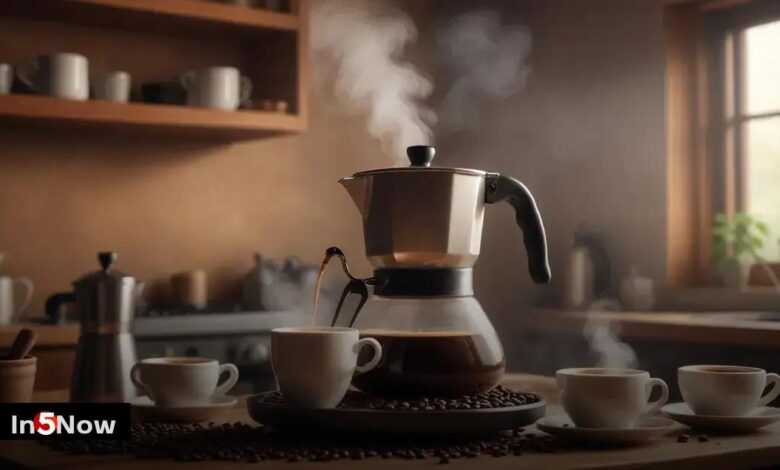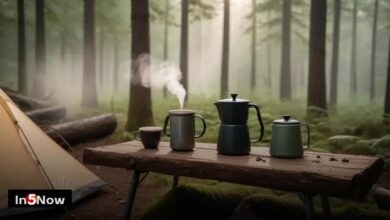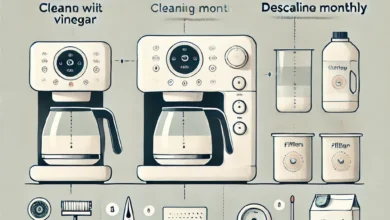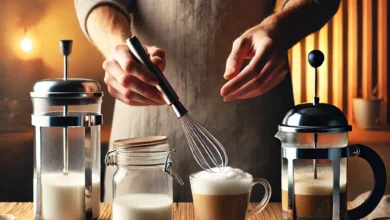How to Brew Strong Coffee Without the Bitterness

To brew strong coffee without bitterness, focus on selecting high-quality coffee beans, using the right grind size and water temperature, and experimenting with brewing methods. Adjusting the coffee-to-water ratio and adding flavoring ingredients can also enhance the overall flavor of your coffee.
Are you looking to learn how to brew strong coffee without bitterness? You’re not alone! Many coffee lovers crave that bold flavor but often struggle with unwanted bitter notes in their brews. In this article, we’ll dive deep into essential tips and techniques that will help you achieve the perfect cup of strong coffee every time. From selecting the right beans to mastering brewing methods, let’s explore how to enjoy your coffee just the way you like it!
Understanding the Basics of Brewing Strong Coffee
To brew strong coffee without bitterness, it’s crucial to understand the basics of the brewing process. The strength of your coffee depends on various factors, including the coffee bean type, grind size, water quality, and brewing time.
Choosing the Right Coffee Beans
Your coffee’s flavor is largely determined by the beans. For a bolder taste, consider using darker roasts or specialty beans known for their strong profile. These types of coffee often contain less acidity, which can help reduce bitter flavors.
The Role of Grind Size
Grind size plays a significant role in extraction. Finer grinds release flavors faster, but if over-extracted, they can lead to bitterness. A medium-coarse grind is often ideal for strong brews, allowing for optimal flavor extraction without causing bitterness.
Water Quality and Temperature
The quality of your water also impacts your coffee. Use filtered water to avoid unwanted minerals that can alter flavor. Additionally, the brewing temperature should be between 195°F and 205°F (90°C to 96°C) for ideal extraction, as boiling water can scorch the coffee and create bitterness.
Brewing Time
Lastly, pay attention to brewing time. Too short can result in weak coffee, and too long can lead to bitterness. For methods like French press or pour-over, aim for a brewing time of about 4-5 minutes for a robust flavor without adverse bitterness.
Choosing the Right Coffee Beans
Choosing the right coffee beans is essential to brew strong coffee without bitterness. The type and quality of beans significantly affect the flavor and strength of your coffee.
Types of Coffee Beans
There are several types of coffee beans, with the two most popular being Arabica and Robusta. Arabica beans are known for their smooth and sweet flavor, while Robusta beans are stronger and have a more bitter taste. For a bold coffee experience, consider using a blend of both types.
Freshness Matters
Freshly roasted beans make a huge difference. Look for beans that have been roasted recently, ideally within the last two weeks. When beans are stale, they lose flavor and can contribute to bitterness in your coffee.
Single Origin vs. Blends
You can choose between single-origin coffee and blends. Single-origin coffee comes from one location and has unique flavor profiles. It can be an excellent choice for those looking to explore diverse tastes. Blends, on the other hand, are formulated to create a balanced flavor, making them a reliable option for brewing strong coffee.
Flavor Profiles
When selecting beans, pay attention to their flavor profiles. Look for beans that are described as “chocolaty,” “nutty,” or “caramelized,” as these flavors tend to complement the boldness without adding bitterness. Avoid beans labeled as “earthy” or overly acidic, as these may lead to a bitter cup.
Experiment to Find Your Preference
Don’t be afraid to try different beans and brands. Every coffee drinker has their unique preference. Experiment with various roasts and origins to find the perfect beans for brewing strong, yet smooth coffee.
Techniques for Brewing Less Bitter Coffee
Brewing less bitter coffee is achievable by employing specific techniques that enhance flavor while minimizing bitterness. Here are some effective methods to consider.
Optimal Brewing Time
One of the key factors in reducing bitterness is the brewing time. If coffee is brewed too long, it releases more bitter compounds. For methods like French press, aim for a brewing time of 4 minutes. For pour-over, stick to about 3-4 minutes.
Adjusting Grind Size
The grind size of your coffee beans significantly affects the extraction process. A coarser grind typically leads to less bitterness, as it limits the surface area exposed to water. Experimenting with grind size can help you find the balance for your taste preference.
Water Temperature
The temperature of the water used for brewing is crucial. Water that is too hot can cause over-extraction, leading to bitter flavors. Ideally, aim for a water temperature between 195°F and 205°F (90°C to 96°C) to achieve a perfect extraction without bitterness.
The Right Coffee-to-Water Ratio
Finding the perfect coffee-to-water ratio can dramatically influence the taste of your coffee. A common guideline is to use 1 to 2 tablespoons of coffee for every 6 ounces of water, but feel free to adjust based on your strength preferences.
Using Quality Water
Water quality plays a vital role in coffee flavor. Always use filtered water to avoid harmful minerals that can alter the taste. Soft water helps extract flavors better without enhancing bitterness.
The Importance of Water Temperature
The temperature of water used in brewing coffee is crucial for achieving the best flavor without bitterness. Using the right water temperature can make a significant difference in the taste of your coffee.
Optimal Temperature Range
The ideal water temperature for brewing coffee is between 195°F and 205°F (90°C to 96°C). This temperature range allows for the proper extraction of flavors from the coffee grounds. If the water is too cold, under-extraction occurs, resulting in weak coffee. Conversely, water that is too hot can lead to over-extraction, which can produce bitter flavors.
Effects of Temperature on Flavor
By maintaining the right water temperature, you can enhance the sweetness and complexity of the coffee while reducing undesirable bitter compounds. Proper extraction ensures that the aromatic oils and soluble acids are well balanced, contributing to a flavorful cup.
How to Measure Water Temperature
To accurately measure water temperature, consider using a thermometer specifically designed for brewing. Alternatively, a kettle with temperature control can also help ensure that you hit the sweet spot for brewing. Wait about 30 seconds after boiling to allow the water to cool to the optimal temperature.
Types of Brewing Methods Affected by Temperature
Different brewing methods may require slightly different water temperatures. For example, espresso requires water closer to 200°F (93°C), while French press coffee benefits from a slightly lower temperature. Understanding the specific needs of your brewing method can greatly affect the final product.
Tips for Maintaining Temperature
To maintain the ideal temperature during brewing, preheat your brewing equipment with hot water before use. This simple step helps prevent rapid cooling when hot water comes into contact with cold materials, preserving the water temperature for optimal brewing.
Tips for Enhancing Flavor in Strong Coffee
Enhancing the flavor in your strong coffee can elevate your coffee experience beyond the ordinary. Here are some practical tips to help you achieve a rich, flavorful cup.
Experiment with Coffee-to-Water Ratio
The right coffee-to-water ratio is essential for a strong flavor. A common starting point is to use 1 to 2 tablespoons of coffee for every 6 ounces of water. Adjust this ratio depending on personal taste; less water for a bolder flavor and more for a milder brew.
Add Flavoring Ingredients
Incorporating flavoring ingredients can enhance your coffee significantly. Try adding a pinch of cinnamon or a dash of vanilla extract to bring out sweet notes. For a dessert-like experience, consider adding cocoa powder or flavored syrups.
Infuse with Spices
Spices like nutmeg, cardamom, or allspice can add depth to your coffee’s flavor profile. Add these spices directly to the coffee grounds before brewing for a subtle infusion or sprinkle on top of your cup for a finishing touch.
Enhance with Milk or Cream
Adding milk or cream not only makes coffee creamier and smoother but also reduces bitterness. Whole milk, half-and-half, or even plant-based alternatives like almond or oat milk can contribute to a richer flavor.
Cold Brew for Smooth Flavor
Consider trying cold brew coffee if you’re looking for a smoother, less acidic flavor. Brewing coffee with cold water over an extended period extracts different flavor compounds, resulting in a unique taste profile that is less bitter.
In Conclusion: Brewing Strong Coffee Without Bitterness
Learning how to brew strong coffee without bitterness can change your coffee experience. By following the tips we discussed, like choosing the right beans, controlling water temperature, and adjusting grind size, you can make delicious coffee every time.
Don’t forget to experiment with flavors and techniques, such as adding spices or trying different brewing methods, to find out what you like best.
Brewing a rich, flavorful cup of coffee is within your reach. So grab your supplies and start brewing today for a satisfying coffee experience!
FAQ – Frequently Asked Questions About Brewing Strong Coffee Without Bitterness
What type of coffee beans should I use for strong coffee?
Choose high-quality beans, preferably a mix of Arabica for sweetness and Robusta for strength. Dark roasts can help reduce acidity and bitterness.
How does water temperature affect coffee brewing?
The ideal water temperature for brewing coffee is between 195°F and 205°F. This helps extract flavor without causing bitterness.
What grind size should I use for brewing strong coffee?
A medium-coarse grind is usually best for brewing strong coffee, as it allows for optimal extraction while reducing bitterness.
How can I make my coffee taste better?
Experiment with adding spices, flavored syrups, or using milk and cream to enhance the flavor of your coffee.
What coffee brewing methods can help reduce bitterness?
Methods like cold brew or French press can help produce smoother coffee with less acidity and bitterness, especially when done with the right techniques.
Is there a way to control the strength of my coffee?
Yes, adjust the coffee-to-water ratio according to your taste preference. Generally, use 1 to 2 tablespoons of coffee for every 6 ounces of water.



